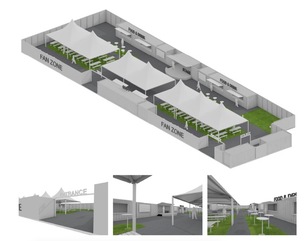There are lots of Barnsley phrases that you don’t hear so much these days.
Somebody who’s just taking up space and looking vacant would be described as ‘stood theer like Souse’, whoever Souse was, and that same person could be described as ‘stood theer like Clem’ and Clem is similarly obscure, although I guess it could be the old politician Clem Attlee.
If someone is daft they could be said to be ‘waiting for the drop of York’ and they could be that daft they would ‘stand for the egg under t’cap’.
If these phrases are on their way out we can say them more often just to get them back into common parlance and everyday linguistic currency, which is a good thing, but we could also go one step further and invent some new ones that will eventually take their place alongside Clem and Souse and that egg under that cap.
So that’s what I’m proposing this week: I’m going to invent some sayings and I’m going to say them as often as I can in the hope that in years to come they’re everywhere. Where to start, though? Where to start?
Well, I reckon that for a new phrase to take hold it has to begin by being local and then maybe it will spread.
So how about rather than being ‘stood theer like Clem’, you could be stood theer like Darfield Church Hall. I’ll try saying it, in the privacy of my own home: ‘Well, he were stood theer like Darfield Church Hall!’
Well, maybe. It seems to work. But does it only work because I know what Darfield Church Hall looks like, or does it work because of the inherent ridiculousness of comparing someone to a building?
Maybe I’ll just lengthen the phrase a little, which might add to its comedy value: ‘Well, he were stood theer like Darfield Church Hall in’t rain!’ or ‘well, he were stood theer like Darfield Church Hall in’t fog!’
I reckon they both work but maybe the fog is slightly funnier, I haven’t the foggiest, to be honest. I haven’t the rainiest. Now I’m tempted to make the phrase longer to add more comedy value but it's soon obvious that doesn’t work: ‘Well, he were stood theer like Darfield Church Hall in’t fog wi’ somebody just comin’ art on’t door who’d just bin to a Zumba class.’
No. That doesn’t work. Less appears to be more when you’re making new sayings up.
Although having said that, maybe if I inserted a day of the week that might make it funnier and more memorable; but the question is, are some days of the week funnier than others?
‘Well, he were stood theer like Darfield Church Hall on a Monday!’ or ‘well, he were stood theer like Darfield Church Hall on a Thursday!’
Monday works better in this context, I think, because Monday is seen as an inherently miserable (and therefore for our purposes funnier) day.
Could this become a phrase with variations all over the borough? ‘Well, he were stood theer like Mapplewell Village Hall in’t fog!’ ‘Well, he were stood theer like Worsborough Mill in’t fog!’ Possibly, possibly. Worth investigating with a map in your hand.
The fact that the person was stood makes the phrase work too; being ‘stood theer’ suggests that you’ve just arrived at a place and it’s perhaps dawning on you that you’ve arrived at the wrong place, whereas to be ‘sat theer’ suggests that you’ve been there a while and that somehow, without stating as much, you’re in the right place.
‘Lying theer like Darfield Church Hall’ doesn’t work because it would suggest that Darfield Church Hall had been demolished, which the last time I looked it hadn’t.
It's hard work, isn’t it, making up these new phrases. But you’ve got to get them right to make them work, I hope you’ll agree.
Now comes the crucial test: I’ll go for a stroll and test out one of these sayings on somebody to see if they work in the wild, as it were.
Ah, here’s somebody I know vaguely waiting for a bus. He gives me the perfect opening line to reply to: ‘Has tha sin owt on your John?’ he says, referring to my brother.
And I reply ‘last time I saw him he were stood theer like Darfield Church Hall’.
He looks blank. Maybe it’ll be a while before it catches on. Do feel free to use it!


























